
Tens of thousands of people attend a rally to celebrate the end of minority rule in 1980

Dictator Robert Mugabe has kept the trappings of liberation

Mugabe's police mete out repression to striking workers
The struggle against white rule in Zimbabwe in the 1970s galvanised a generation in the hope of a new Africa. Now the country has become a byword for repression. Leo Zeilig traces the death of a dream
On 18 April 1980 the Union Jack was pulled down, the Zimbabwean flag raised and Bob Marley and the Wailers played live to thousands. Zimbabwe was independent.
The victory over the Rhodesian regime of Ian Smith was celebrated around the world. Prime minister Robert Mugabe was the incarnation of the struggle that had bought Zimbabwe's freedom.
Zimbabwe emerged out of the authoritarian and racist state established by the British a century previously. In 1890 the territory was marked out and handed to the imperialist adventurer Cecil Rhodes, who controlled the area for his British South Africa Company.
The following 40 years witnessed the mass expropriation of land from peasant farmers, the repression of any resistance, and forced labour in mines and factories. Thousands of Africans were forced off their land and herded into "communal lands", or reservations.
In 1962 the Rhodesian Front, a right wing party headed by the racist
Ian Smith, won power. Smith declared independence from Britain in 1965, in what was called a Unilateral Declaration of Independence.
The decision to declare independence was made in the context of the growth of resistance in Rhodesia and rising politicisation.
Smith ruled with an iron fist. His government killed thousands of so-called terrorists and herded rural Zimbabweans into concentration camps to cut them off from the nationalist freedom fighters.
Robert Gabriel Mugabe was among a group of radical nationalists that formed the Zimbabwe African National Union (Zanu) in 1963. He showed his personal commitment to the struggle – he spent the decade from 1964 in a variety of prison camps and jails.
By the end of 1978 the united nationalist armed forces were somewhere between 35,000 and 40,000 strong. The government's forces were engaged on approximately six fronts, with martial law imposed throughout the whole country.
In 1980 liberation had been won. Mugabe was the radical voice of Zimbabwean freedom, promising before independence that "none of the white exploiters will be allowed to keep an acre of their land".
He vowed to end the massive inequalities in Zimbabwean society where more than 80 percent of industrial production was controlled by foreign capital and only 4,000 mostly white farmers controlled 70 percent of the most fertile land.
In the early 1980s the new government increased spending on health and education. Enrolment increased in primary education from 1.2 million in 1980 to more than 2.2 million by 1989, and in secondary schools from only 74,000 to 671,000 in the same period.
Arthur Mutambara, now a leader of the MDC opposition, remembers how he worshipped Mugabe, "He was my hero, I used to idolise him. I was sold to the socialist agenda and Zanu was our party of revolution."
But independence in Zimbabwe had been won on strict conditions. The 1979 Lancaster House agreement that led directly to independence guaranteed that the property rights of the white majority would be safeguarded.
Mugabe left the farmers untouched. They were now not the "colonialists" and "imperialists" but rather useful allies to the regime.
The compromises, delays and ultimately the failure to confront the issue of redistribution were representative of Mugabe's general approach.
He preached reconciliation with his old enemies, "If yesterday I fought you as an enemy, today you have become a friend. If yesterday you hated me, today you cannot avoid the love that binds you to me and me to you."
As one person observed, "Despite its Marxist-Leninist rhetoric the Zanu-PF government tried to preserve the largely white-owned productive structures."
The old structures of state repression remained intact.
Zanu massacred black opponents in Matabeleland, in the south of the country. It has been estimated that between 1981 and 1988 between 10,000 and 20,000 "dissidents"' were killed.
The main trade union federation, the Zimbabwe Congress of Trade Unions (ZCTU), was packed with Mugabe's friends.
However, by the mid-1980s the economy had begun to stagnate. From 1986 per capita GDP declined rapidly. Loans from the World Bank were accepted by the government, causing foreign debt to rise from £400 million in 1980 to £1.5 billion in 1990.
The government introduced the first full Economic Structural Adjustment Programme (ESAP) in 1991.
Following similar – and similarly disastrous – programmes in most of Africa, the World Bank and the IMF insisted on the removal of import controls, changes to what was regarded as "restrictive" labour legislation and widespread public sector reforms.
Strikes
The effects of these reforms were devastating. The year after the implementation of the ESAP saw an 11 percent fall in GDP. In 1993 unemployment reached a record 1.3 million from a total population of about 10 million.
New militancy was born out of the attacks. The old leadership of the ZCTU was replaced by a new one. In 1988 Morgan Tsvangirai – a mine worker and activist – became general secretary of the ZCTU.
In 1996 Zimbabwean society exploded. In August there was the first national government workers' strike. Tens of thousands came out on strike against job losses, bad working conditions and government corruption. As the strike continued it developed clearly political aims.
An elected committee of rank and file trade unionists directed the strike. Flying pickets moved from workplace to workplace arguing with workers to join the movement.
The following year saw more demonstrations and strikes than at any time since independence. As Tendai Beti, a leading activist at the time, remembers, "You could smell working class power in the air."
University students, informal traders and workers recently made redundant joined the struggle. Brian Kagoro, a student leader in 1997, recalls, "You now had students supporting their parents on their grants, because their parents had been laid off work. As poverty increased you had a convergence of these forces."
Former fighters from the guerrilla war against the Rhodesian state became galvanised by the mass upheavals. These war veterans denounced Mugabe.
The ZCTU repeatedly sought to lead and direct the mass movement. Rank and file activists, often organising in labour forums – where large groups of workers met to discuss politics – rushed ahead of union bureaucrats in organising strikes and demonstrations.
From 1998 a recurrent theme of the labour forums was the demand for the ZCTU to form a workers' party.
Finally in September 1999 the Movement for Democratic Change (MDC) was born, and Morgan Tsvangirai became the movement's first leader. The MDC was formed directly out of the ZCTU, promising redistribution of wealth to the poor. The mood in the country was jubilant.
The party almost won the parliamentary election in 2000, winning 57 of 120 elected seats. The fact that it came close to toppling such a violent regime after having only existed for 16 months is an indication of the extent of the changes that were sweeping Zimbabwean society.
The MDC retained a working class base, but various NGOs, academics, businessmen and lawyers had added their voices to the calls for a new opposition. So the demands for a new party carried a contradiction.
On the one hand they came from the labour forums and the streets, who wanted an end to privatisation, anti-union laws and the power of big business.
But on the other hand pressure was mounted by the middle class and some sections of business who were threatened by the movement they now sought to co-opt.
Mugabe was attacked by the masses, but he had also angered the global powers. The IMF and World Bank shunned the regime, arguing it had caved in too easily to "sectional interests".
Mugabe realised that the regime had to move quickly, and government rhetoric began to lambast "Western racism".
Land was key to this reorientation. The government sanctioned the occupation by war veterans of white-owned farms.
Before long Mugabe had outmanoeuvred the opposition in his party and won most of the regime behind his new "left wing" stance. He remarketed himself as a leader of the fight against imperialism and globalisation.
But his partial withdrawal from structural adjustment was a cynical move forced on him by popular resistance and working class struggles.
The reality for most Zimbabweans has been a continuation of the same policies while the regime mouths platitudes about "foreign powers".
Privatisation continues and the cost of fuel and food rises, while land is redistributed mainly to a coterie of Mugabe's cronies.
Over the past three years Gideon Gono, the Reserve Bank governor, has rolled out an unforgiving programme of neoliberal reforms that have slashed subsidies to the poor, while resuming debt repayments to the International Monetary Fund. Mugabe has given the governor his full support.
Millions face a daily struggle to survive, as unemployment has reached 80 percent.
Morgan Tsvangirai has repeatedly threatened to remove Mugabe by extra-parliamentary activity if he refuses to go legally. But the path to this action has been blocked by a combination of repression and economic crisis.
The regime has unleashed a wave of terror, which has helped to paralyse the MDC.
Militants
Madzewo Chimuka, general secretary of Zimbabwe's Graphical Workers Union (ZGWU), explains, "Though we organised two national strikes in 2004, the environment was incredibly difficult. We had about 50 workers who were severely beaten by police."?
The MDC remains the repository of hope for the majority of Zimbabweans, who see the party as the only way of ridding the country of Mugabe.
Behind the party is the support of a generation of working class militants, who formed the movement in 1999 and stand firmly with it.
Canwell Muchadya, president of the ZGWU, expresses the difficulties for
the opposition today. He said, "There is no rule of law and no jobs in Zimbabwe, so for the opposition to say to workers, 'Come, let's fight' is very difficult because people will respond, 'I will be beaten by the police and lose my job'."?
Real improvements for Zimbabwe's workers and peasants will not come from the authoritarian neoliberalism of Mugabe. Nor will they come from the policies of George Bush and Tony Blair, those false friends of freedom who claim to want democracy in Zimbabwe.
Mugabe can be removed by a coup in his own party, by pressure from the West, or by a movement from below.
The fight is to achieve that final option, where workers and peasants mobilise and shape the fall of Mugabe in a way that benefits the majority rather than the imperialist world order.
© Copyright Socialist Worker (unless otherwise stated). You may republish if you include an active link to the original and leave this notice in place.
Yahoo! Answers - Got a question? Someone out there knows the answer.
Try it now.





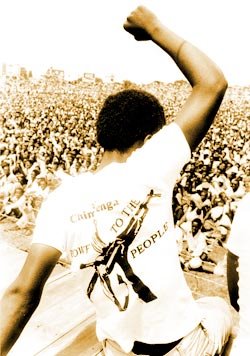
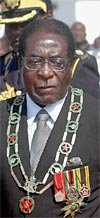
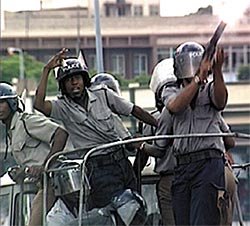






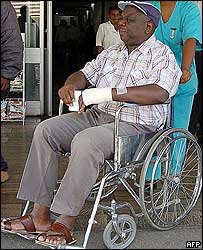
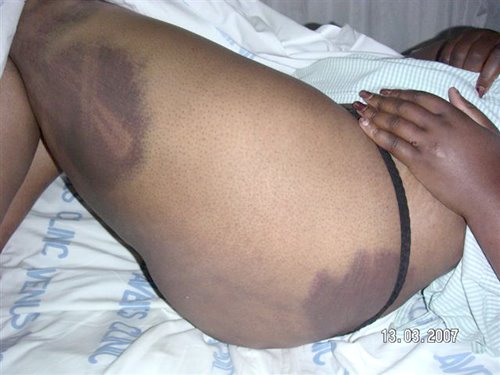
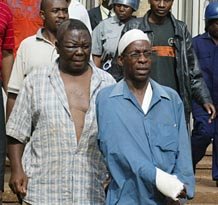
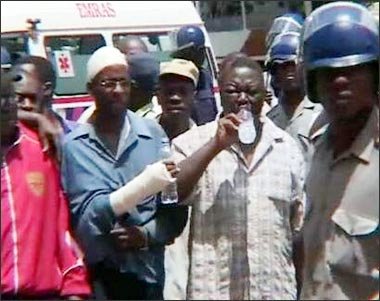
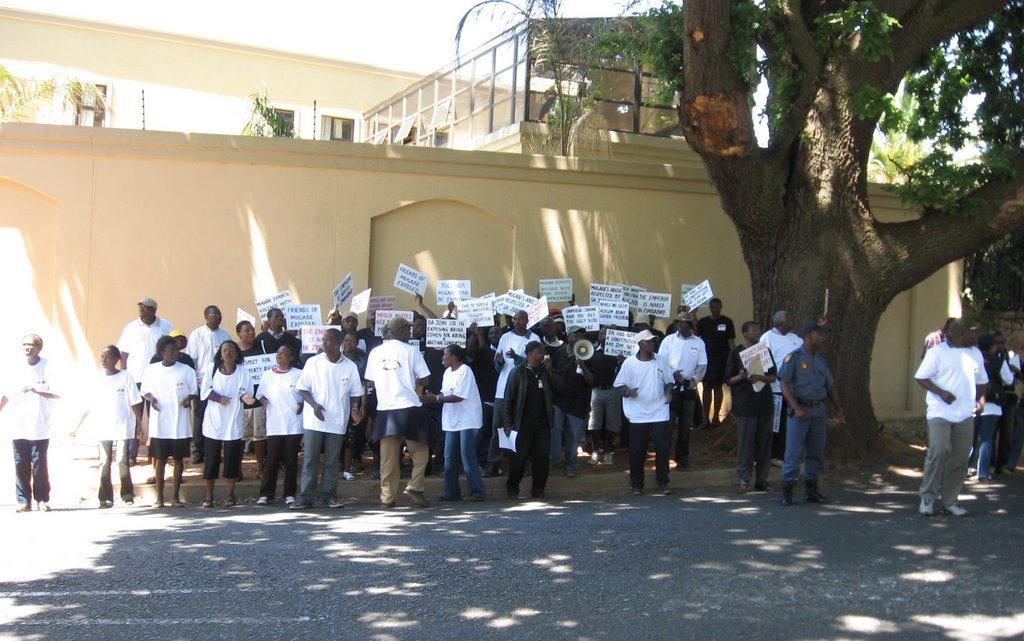
No comments:
Post a Comment